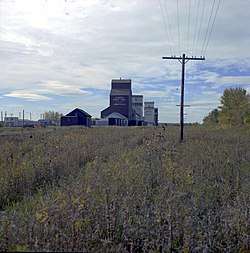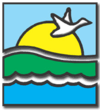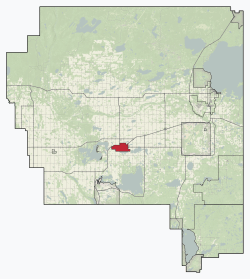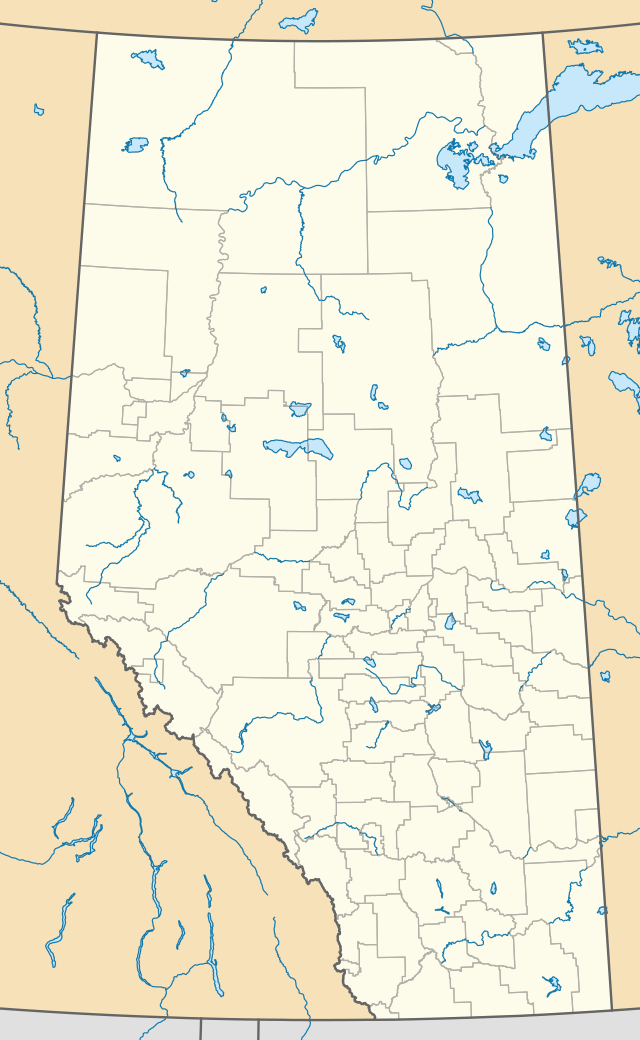Bonnyville
Bonnyville is a town situated in east-central Alberta between Cold Lake and St. Paul. The surrounding Municipal District (MD) of Bonnyville No. 87's municipal office is located in Bonnyville.
Bonnyville | |
|---|---|
Town | |
| Town of Bonnyville | |
 Grain elevators, 1974 | |
 Flag  | |
| Motto(s): It's Multi-Natural | |
 Location in the MD of Bonnyville No. 87 | |
 Bonnyville Location of Bonnyville in Alberta | |
| Coordinates: 54°16′05″N 110°43′49″W | |
| Country | |
| Province | |
| Region | Northern Alberta |
| Planning region | Lower Athabasca |
| Municipal district | Municipal District of Bonnyville No. 87 |
| Incorporated[1] | |
| • Village | September 19, 1929 |
| • Town | February 3, 1948 |
| Government | |
| • Mayor | Gene Sobolewski |
| • Governing body | Bonnyville Town Council |
| • MP | Shannon Stubbs (Conservative)—Lakeland |
| • MLA | Dave Hanson (United Conservative Party) — Bonnyville-Cold Lake-St. Paul |
| Area (2016)[3] | |
| • Land | 14.18 km2 (5.47 sq mi) |
| Elevation | 564 m (1,850 ft) |
| Population (2016)[5] | |
| • Total | 5,975 |
| Time zone | UTC−7 (MST) |
| • Summer (DST) | UTC−6 (MDT) |
| Forward sortation area | T9N |
| Area code(s) | +1-780, +1-587 |
| Highways | Highway 28 Buffalo Trail |
| Waterways | Moose Lake Beaver River |
| Website | Official website |
The community derives its name from Father Bonnin, a Roman Catholic priest.[6]
Geography
Bonnyville is located on the north shore of Jessie Lake.[7] The lake is an important staging area for thousands of migrating birds, and therefore attracts birdwatchers. Other nearby lakes include Moose Lake and Muriel Lake.
Demographics
| Year | Pop. | ±% |
|---|---|---|
| 1991 | 5,132 | — |
| 1996 | 5,100 | −0.6% |
| 2001 | 5,709 | +11.9% |
| 2006 | 5,832 | +2.2% |
| 2011 | 6,216 | +6.6% |
| 2016 | 5,975 | −3.9% |
| Source: Statistics Canada[5][8] | ||
The population of the Town of Bonnyville according to its 2017 municipal census is 6,422,[9] a change of -7.2% from its 2014 municipal census population of 6,921.[10]
In the 2016 Census of Population conducted by Statistics Canada, the Town of Bonnyville recorded a population of 5,975 living in 2,281 of its 2,706 total private dwellings, a -3.9% change from its 2011 population of 6,216. With a land area of 14.18 km2 (5.47 sq mi), it had a population density of 421.4/km2 (1,091.3/sq mi) in 2016.[3][5]
In the 2011 Census, the Town of Bonnyville had a population of 6,216 living in 2,324 of its 2,482 total dwellings, a 6.6% change from its 2006 population of 5,832. With a land area of 14.1 km2 (5.4 sq mi), it had a population density of 440.9/km2 (1,141.8/sq mi) in 2011.[8]
Population controversy
The determination of the Town of Bonnyville's population has been subject to controversy since 2006.[11] Most recently, Statistics Canada's February 2017 release of the population and dwelling counts from the 2016 census reported an overall population of 5,417,[3] which was 1,504 residents fewer than 6,921 permanent residents the municipality counted in its own census conducted in 2014,[12] and 799 less than the 6,216 counted in Statistics Canada's 2011 census.[8] The population count as initially reported by Statistics Canada resulted in a change of -12.9%, which gave Bonnyville the distinction of being the municipality in Canada, among those with at least 5,000 inhabitants, that experienced the greatest percentage loss in population between 2011 and 2016.[13] The Town of Bonnyville disputed the 2016 census results[14] and conducted its own census in 2017 that counted a population of 6,422,[15] which was 1,005 higher than the 2016 population published by Statistics Canada and 499 less than what the town had counted in 2014. Later in 2017, Statistics Canada issued a revised 2016 population count of 5,975 for Bonnyville, 558 higher than the originally reported population of 5,417.[5]
Language
Although English is the dominant language in Bonnyville, it is home to a notable Franco-Albertan minority.[16] Its most common non-official mother tongues are Tagalog and Ukrainian.
| Mother tongue, 2016 census[17] | Number of speakers | Percentage |
|---|---|---|
| English | 4,390 | 81.1% |
| French | 335 | 6.2% |
| Tagalog | 140 | 2.6% |
| Ukrainian | 60 | 1.1% |
| Other | 370 | 6.8% |
| Multiple responses | 120 | 2.2% |
| Total responses | 5,415 | 100.0% |
Visible minorities and Aboriginals
| Visible minority and Aboriginal population (Canada 2016 Census)[18] | |||
|---|---|---|---|
| Population group | Population | % of total population | |
| White | 4,155 | 76.8% | |
| Visible minority group | South Asian | 35 | 0.6% |
| Chinese | 2 | 0% | |
| Black | 30 | 0.6% | |
| Filipino | 255 | 4.7% | |
| Latin American | 25 | 0.5% | |
| Arab | 110 | 2% | |
| Southeast Asian | 0 | 0% | |
| West Asian | 0 | 0% | |
| Korean | 0 | 0% | |
| Japanese | 10 | 0.2% | |
| Visible minority, n.i.e. | 0 | 0% | |
| Multiple visible minority | 15 | 0.3% | |
| Total visible minority population | 545 | 10.1% | |
| Aboriginal group | First Nations | 270 | 5% |
| Métis | 440 | 8.1% | |
| Inuit | 0 | 0% | |
| Aboriginal, n.i.e. | 15 | 0.3% | |
| Multiple Aboriginal identity | 0 | 0% | |
| Total Aboriginal population | 710 | 13.1% | |
| Total population | 5,410 | 100% | |
Economy
Bonnyville's economy is based on nearby oil reserves and agricultural resources, and benefits from its location between the markets of St. Paul and Cold Lake.
Attractions
In celebration of Bonnyville's centennial year (2007), the town constructed the Centennial Centre, an educational and recreational centre, as an extension of the R. J. Lalonde Arena and the Bonnyville & District Agriplex. Its construction was somewhat controversial as its cost exceeded the original estimate and required a tax hike for both residents of the town and the municipal district.
Sports
Bonnyville is home to the Bonnyville Pontiacs, a junior hockey team playing in the Alberta Junior Hockey League and also a senior hockey team, The Bonnyville Senior Pontiacs. The teams plays out of the R. J. Lalonde Arena, which is part of the Bonnyville & District Centennial Centre.[19]
Government
| MLAs representing Bonnyville | ||||
|---|---|---|---|---|
| Assembly | Years | Member | Party | |
| Part of St. Paul | ||||
| 6th | 1926–1930 | Laudas Joly | United Farmers | |
| 7th | 1930–1935 | Joseph Dechene | Liberal | |
| 8th | 1935–1940 | Joseph Beaudry | Social Credit | |
| 9th | 1940–1944 | |||
| 10th | 1944–1948 | |||
| 11th | 1948–1952 | |||
| Part of Bonnyville | ||||
| 12th | 1952–1955 | Laudas Joly | Social Credit | |
| 13th | 1955–1959 | Jake Josvanger | Liberal | |
| 14th | 1959–1961 | Karl Nordstrom | Social Credit | |
| 1961 | Vacant | |||
| 1961–1963 | Romeo Lamothe |
Social Credit | ||
| 15th | 1963–1967 | |||
| 16th | 1967–1971 | |||
| 17th | 1971–1975 | Donald Hansen | Progressive Conservative | |
| 18th | 1975–1979 | |||
| 19th | 1979–1982 | Ernie Isley | ||
| 20th | 1982–1986 | |||
| 21st | 1986–1989 | |||
| 22nd | 1989–1993 | |||
| 23rd | 1993–1997 | Leo Vasseur | Liberal | |
| Part of Bonnyville-Cold Lake | ||||
| 24th | 1997–2001 | Denis Ducharme | Progressive Conservative | |
| 25th | 2001–2004 | |||
| 26th | 2004–2008 | |||
| 27th | 2008–2012 | Genia Leskiw | ||
| 28th | 2012–2015 | |||
| 29th | 2015–2017 | Scott Cyr | Wildrose | |
| 2017–2019 | United Conservative | |||
| Part of Bonnyville-Cold Lake-St. Paul | ||||
| 30th | 2019– | TBD | ||
Bonnyville Town Council is composed of a mayor and six councilors, all directly elected at large. The current mayor, as of the 2013 election, is Gene Sobolewski. The offices of the Municipal District of Bonnyville are located within the town.
Bonnyville is located within the Bonnyville-Cold Lake provincial electoral district. The current MLA is Scott Cyr, the Wildrose justice critic, first elected in 2015. Previous MLAs include Genia Leskiw and Denis Ducharme.
Federally, Bonnyville falls within the electoral district of Lakeland, a newly re-created riding which is currently held by Shannon Stubbs of the Conservative Party, also first elected in 2015.
Financial institutions
Options for banking services in Bonnyville include: Lakeland Credit Union, ATB Financial, RBC Royal Bank of Canada, TD Canada Trust and CIBC.[20]
Education
Lakeland Catholic School District No. 150 and Northern Lights School Division No. 69 operate public schools within Bonnyville.[21][22]
- Lakeland Catholic School District No. 150
- École Notre Dame Elementary School (offering kindergarten through grade 4 English and French programming)[23]
- École Dr. Bernard Brosseau School (offering grade 5 through grade 8 English and French programming)[24]
- École Notre Dame High School (offering grade 9 through grade 12 programming)[25]
- Northern Lights School Division No. 69
- Duclos School (offering kindergarten through grade 4 programming)[26]
- H.E. Bourgoin School (offering grade 5 through grade 8 programming)[27]
- Bonnyville Centralized High School (offering grade 9 through grade 12 programming)[28]
- Bonnyville Outreach School (offering grade 9 through grade 12 programming)[29]
Conseil scolaire Centre-Est
- École des Beaux-Lacs (French school offering kindergarten through grade 12 programming)[30]
Media
Bonnyville is served by CKSA-TV-2 (VHF channel 9) a rebroadcaster of private Global affiliate CKSA-DT in Lloydminster.
Notable people
- Denis Ducharme, former provincial politician
- Tyler Ennis, professional hockey player
- Justin Fontaine, professional hockey player
- Ernie Isley, former provincial politician and mayor
- Jon Kalinski, professional hockey player
- Eugenia "Genia" Leskiw, Canadian politician, Progressive Conservative (MLA 2008-2015)
- Tanner Boser, mixed martial artist
References
- "Location and History Profile: Town of Bonnyville" (PDF). Alberta Municipal Affairs. October 7, 2016. p. 78. Retrieved October 11, 2016.
- "Municipal Officials Search". Alberta Municipal Affairs. 2017-09-22. Retrieved 2017-09-25.
- "Population and dwelling counts, for Canada, provinces and territories, and census subdivisions (municipalities), 2016 and 2011 censuses – 100% data (Alberta)". Statistics Canada. February 8, 2017. Retrieved February 8, 2017.
- "Alberta Private Sewage Systems 2009 Standard of Practice Handbook: Appendix A.3 Alberta Design Data (A.3.A. Alberta Climate Design Data by Town)" (PDF) (PDF). Safety Codes Council. January 2012. pp. 212–215 (PDF pages 226–229). Retrieved October 8, 2013.
- "Population and dwelling count amendments, 2016 Census". Statistics Canada. October 6, 2017. Retrieved October 9, 2017.
- Place-names of Alberta. Ottawa: Geographic Board of Canada. 1928. p. 22.
- "Civic Address Map" (PDF). Town of Bonnyville. 2008-09-22. Retrieved 2012-07-05.
- "Population and dwelling counts, for Canada, provinces and territories, and census subdivisions (municipalities), 2011 and 2006 censuses (Alberta)". Statistics Canada. February 8, 2012. Retrieved February 8, 2012.
- "2017 Municipal Affairs Population List" (PDF). Alberta Municipal Affairs. ISBN 978-1-4601-3652-2. Retrieved January 13, 2018.
- "2016 Municipal Affairs Population List" (PDF). Alberta Municipal Affairs. ISBN 978-1-4601-3127-5. Retrieved January 13, 2018.
- Kristen Heliotis (February 14, 2017). "Town's census numbers not adding up". Bonnyville Nouvelle. Great West Newspapers LP. Retrieved October 10, 2017.
- "Town of Bonnyville Census Results" (PDF). Town of Bonnyville. July 15, 2014. Retrieved July 17, 2014.
- "Population and dwelling counts, for Canada and census subdivisions (municipalities) with 5,000-plus population, 2016 and 2011 censuses – 100% data". Statistics Canada. August 28, 2017. Retrieved October 10, 2017.
- Gordon Kent (February 9, 2017). "Bonnyville mayor cries foul as census shows double-digit population drop". Edmonton Journal. Postmedia Network Inc. Retrieved October 10, 2017.
- Josh Thomas (August 1, 2017). "Setting the record straight". Bonnyville Nouvelle. Great West Newspapers LP. Retrieved October 10, 2017.
- "Canada 2011 Census: Bonnyville - Community Statistics". Statistics Canada. Retrieved April 25, 2013.
- Canada, Government of Canada, Statistics. "Census Profile, 2016 Census - Bonnyville, Town [Census subdivision], Alberta and Division No. 12, Census division [Census division], Alberta". www12.statcan.gc.ca. Retrieved 2017-10-10.
- Statistics Canada. "Census Profile, 2016 Census - Bonnyville". www12.statcan.gc.ca. Retrieved 2017-11-10.
- "RJ Lalonde Arena". Bonnyville & District Centennial Centre. 2008-09-22. Archived from the original on 2011-12-11. Retrieved 2012-07-05.
- "Archived copy". Archived from the original on 2017-07-14. Retrieved 2014-11-12.CS1 maint: archived copy as title (link)
- "Lakeland Catholic Schools". Lakeland Catholic School District. Retrieved 2012-08-29.
- "Welcome". Northern Lights School Division No. 69. Retrieved 2012-08-29.
- "École Notre Dame Elementary School". Lakeland Catholic School District. Archived from the original on 2012-09-15. Retrieved 2012-08-29.
- "École Dr. Bernard Brosseau School". Lakeland Catholic School District. Retrieved 2012-08-29.
- "École Notre Dame High School". Lakeland Catholic School District. Archived from the original on 2012-04-03. Retrieved 2012-08-29.
- "Duclos School: Programs". Northern Lights School Division No. 69. Archived from the original on 2016-03-11. Retrieved 2012-08-29.
- "H.E. Bourgoin Middle School: Programs of Study". Northern Lights School Division No. 69. Archived from the original on 2012-06-25. Retrieved 2012-08-29.
- "Bonnyville Centralized High School: Programs". Northern Lights School Division No. 69. Archived from the original on 2012-06-24. Retrieved 2012-08-29.
- "Bonnyville Outreach School: Programs". Northern Lights School Division No. 69. Retrieved 2012-08-29.
- "École des Beaux-Lacs: Programs". Conseil scolaire Centre-Est. Archived from the original on 2013-10-21. Retrieved 2012-08-29.